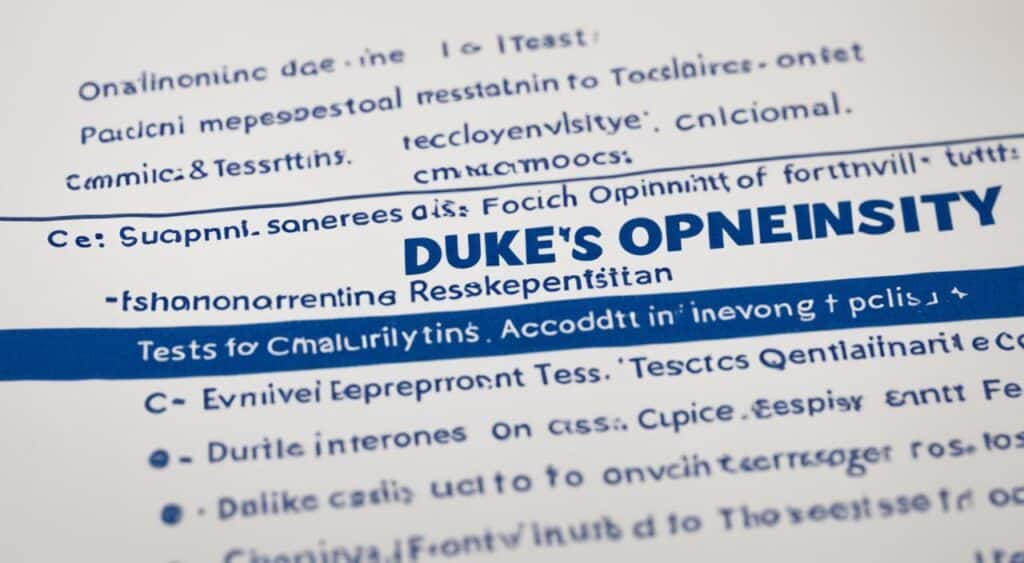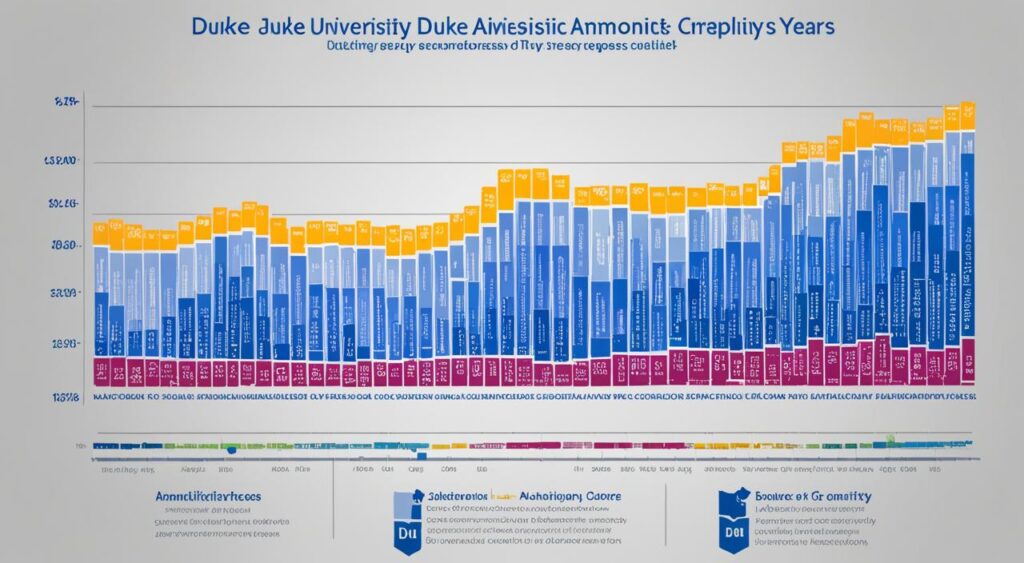Duke University is a top private research school in Durham, North Carolina. It has a student body of 6,542 undergrads and 53 majors. Students from all over the world come here for a life-changing education. You can apply through the Common Application, Coalition Application, or QuestBridge Application.
The application process at Duke is very competitive, with only a 4.8% acceptance rate. You need to send in your application, transcripts, recommendations, test scores (if needed), and essays by November 1 for Early Decision or January 2 for Regular Decision.
Key Takeaways
- Duke University is a highly selective private research university located in Durham, North Carolina.
- The university offers 53 undergraduate majors and has a student body of 6,542 undergraduates.
- Applicants can choose from three application platforms: the Common Application, Coalition Application, and QuestBridge Application.
- The Duke admissions process is highly competitive, with an overall acceptance rate of just 4.8%.
- Applicants must submit their complete application, including transcripts, recommendations, test scores (optional), and supplemental essays, by either the Early Decision deadline of November 1 or the Regular Decision deadline of January 2.
Early Decision vs. Regular Decision Application Deadlines
Applying to Duke University gives students two main choices: Early Decision and Regular Decision. Each path has its own deadlines and rules that students need to think about carefully.
Early Decision Deadlines
The Early Decision program at Duke is a binding deal. This means if a student gets in, they must go to the university. The deadline for Early Decision is November 1. Students must send in everything they need, like transcripts, recommendations, test scores (if needed), and essays, by then.
Regular Decision Deadlines
On the other hand, the Regular Decision deadline is January 2. This choice lets students apply to more colleges. Regular Decision applicants must send in their financial aid forms and all application materials by January 2.
Both Early Decision and Regular Decision applicants must hit all deadlines. They also need to send in a full set of application parts, like transcripts, recommendations, and test scores (if needed).
“The choice between Early Decision and Regular Decision is a personal one, and students should carefully consider their priorities and commitment level before submitting their application.”
Course Requirements and Academic Preparation

Duke University values academic challenge and encourages students to take the toughest courses. Prospective students should aim for four years of English and at least three years each in math, science, foreign languages, and social studies.
To get into Duke, students need to take five academic subjects every year. If a student hasn’t done four years in a subject, they should take a challenging course to fill the gap.
For the Pratt School of Engineering, Duke requires calculus and recommends physics. All students are advised to take advanced courses in many subjects. This includes AP, IB, honors, accelerated, or college courses.
“Duke admissions counselors encourage prospective students to take the most challenging courses available to them.”
| Academic Requirement | Recommended Coursework |
|---|---|
| English | 4 years |
| Mathematics | 3 years (including Calculus for Pratt School of Engineering) |
| Natural Sciences | 3 years (including Physics for Pratt School of Engineering) |
| Foreign Language | 3 years |
| Social Studies | 3 years |
| Academic Courses per Year | 5 academic subjects |
| Advanced-Level Work | AP, IB, Honors, Accelerated, or College Courses |
Application Components

Applying to Duke University requires several key parts. You need to send in your official high school transcript, a counselor recommendation, and two teacher recommendations. You can also send SAT or ACT scores, but they’re not required.
Students can list up to ten extracurricular activities in the Duke application. You can’t send a resume, but you can add more honors and achievements in the “additional information” section.
The Duke application has special essays that are very important. These essays let you share your unique views, experiences, and goals. The essay questions help the admissions team understand what makes you special.
Duke also has an optional personal recommendation and an arts supplement for artsy students. These parts give more insight into your character and skills beyond the basic application.
| Application Component | Description |
|---|---|
| Transcript | Official high school transcript |
| Counselor Recommendation | Letter of recommendation from a high school counselor |
| Teacher Recommendations | Two letters of recommendation from teachers |
| Test Scores (optional) | SAT or ACT scores (no longer required for admission) |
| Essays | Supplemental essays to share your unique perspective |
| Activities | List of up to 10 extracurricular activities |
| Optional Recommendation | Personal recommendation from someone who knows you well |
| Arts Supplement | For students with a particular talent or involvement in the arts |
By putting together these parts, students can show off their academic wins, club activities, and personal traits. This gives the Duke team a full picture of who you are.
Duke University

Duke University is a top private research school in Durham, North Carolina. It’s in the famous Research Triangle area. The school has a diverse student body of 6,542 undergrads. They can pick from 53 different majors.
Duke is known for its strong academic programs. It draws in some of the smartest students from all over the world. The school values excellence, innovation, and working together across different fields. This makes it a top choice for those looking for a challenging and rewarding education.
| Key Facts About Duke University | Details |
|---|---|
| Undergraduate Enrollment | 6,542 students |
| Undergraduate Majors Offered | 53 majors |
| Location | Durham, North Carolina |
| Institutional Type | Private research university |
| Reputation | Highly respected |
Duke is a top choice for students aiming for excellence. It has a great campus life and top resources. No matter your interest, from humanities to sciences, Duke offers a unique education. This can lead to a bright and rewarding future.
Test-Optional Policy and Testing Requirements

Duke University has made a big change for the 2024-25 application cycle. Now, applicants can choose if they want to send in their SAT or ACT scores. If they do send scores, Duke will look at the best scores from each section, no matter when they took the test.
Applicants can also send in self-reported scores. This gives them more freedom. For those who speak English as a second language or didn’t study in English, Duke suggests but doesn’t need English proficiency tests. These tests include the Cambridge C1 Advanced, Cambridge C2 Proficiency, Duolingo, IELTS, PTE Academic, or TOEFL.
SAT and ACT
Applicants to Duke University can choose to send their SAT or ACT scores. But, it’s not a must anymore. Students who don’t send scores won’t be at a loss in the application process.
English Proficiency Tests
For students from other countries or those who didn’t study in English, Duke suggests submitting English proficiency test results. Tests like the Cambridge C1 Advanced, Cambridge C2 Proficiency, Duolingo, IELTS, PTE Academic, or TOEFL show how well applicants can speak English. They prove they’re ready for Duke’s challenging courses.
Admissions Statistics and Selectivity

Duke University is very selective, with only 4.8% of applicants accepted. Early Decision applicants have a better chance, with a 16.4% acceptance rate. This shows the benefits of applying early.
Duke demands a lot from its students, as shown by the SAT/ACT scores of its accepted students. These scores range from 1490-1560 for the SAT and 33-35 for the ACT. Also, 95% of students who got in were in the top 10% of their class, showing Duke’s high academic standards.
To check if applicants fit Duke’s standards, the university uses an Academic Index. This score looks at a student’s grades and helps find those who can do well at Duke.
| Admissions Statistic | Data |
|---|---|
| Overall Acceptance Rate | 4.8% |
| Early Decision Acceptance Rate | 16.4% |
| Regular Decision Acceptance Rate | 4.8% |
| Middle 50% SAT Scores | 1490-1560 |
| Middle 50% ACT Scores | 33-35 |
| Students in Top 10% of High School Class | 95% |
The stats show how tough it is to get into Duke University. To get in, students need top grades and a strong interest in their field.
Interviews and Optional Materials

Prospective students can show off their talents and interests at Duke University with optional parts of their application. These include alumni interviews and art supplements.
Alumni Interviews
Duke lets applicants have an interview with a local alumni. These interviews happen first come, first served where alumni are available. Students need to apply by the Early Decision deadline or the Regular Decision priority interview deadline to be considered.
An interview is not needed but can be a great chance to show who you are. It lets applicants share their personality, interests, and why they want to go to Duke.
Art Supplements
For those with a strong talent in the arts, Duke encourages extra materials. This includes dance, music, photography, film, or theater. These art supplements should show off your skills and any awards and honors you’ve earned.
| Artistic Discipline | Supplemental Material Examples |
|---|---|
| Dance |
|
| Music |
|
| Visual Arts |
|
By submitting art supplements, Duke gets a better look at your creative skills. This helps them see how you can add to the university’s artistic community.
Also Read : The Secret Advantages Of University Scholarships
Financial Aid and Scholarships

Duke University makes its top-notch education available to students from various financial backgrounds. It gives out $130 million in grant aid every year. More than half of undergrads pay less than the full cost to attend.
Duke meets 100% of the financial need for admitted students. This means 70% of Duke students graduate without any debt. It shows Duke’s strong commitment to helping students financially.
Duke also offers merit scholarships, like the Robertson Scholars Program, which covers all costs. To get financial help, students must send in the FAFSA and CSS Profile by the deadlines.
Duke University’s strong support for financial aid and scholarships means students can get a great education without a lot of debt. Its focus on debt-free education and merit-based awards makes it a top choice for students wanting a quality education without loans.
| Financial Aid Type | Key Details |
|---|---|
| Need-Based Grants | Duke meets 100% of demonstrated financial need for admitted students |
| Merit Scholarships | Prestigious programs like the Robertson Scholars Program offer full-ride awards |
| Debt-Free Graduation | 70% of Duke students graduate without any student loan debt |
“Duke’s commitment to financial aid ensures that an excellent education is within reach for students from all economic backgrounds.”
Conclusion
Applying to Duke University is tough, with only a 4.8% acceptance rate. To boost your chances, get to know the application deadlines and what Duke looks for. Also, explore the university’s financial aid and scholarship options to make it more affordable.
Getting into Duke is hard, but if you’re well-prepared and show real interest, you might stand out. Duke is a top private research university with a long history and a diverse community. It offers a unique learning experience for those ready for the challenge of the application process.
By understanding the admissions requirements and using the resources available, you can set yourself up for success at this highly selective school. Duke is known for its top-notch education, groundbreaking research, and its role in shaping future leaders.
FAQs
Q: What is Duke University’s ranking in the university rankings?
A: Duke University consistently ranks among the top universities in the world, often placing within the top 10 in various university rankings.
Q: How can I explore campus life at Duke University?
A: To explore campus life at Duke University, you can take a virtual tour of the campus, attend admissions events, or connect with current students to get a glimpse of what it’s like to study and live on campus.
Q: What are some of the major disciplines offered at Duke University?
A: Duke University offers a wide range of majors, including but not limited to public policy, nursing, political science, and Asian studies, providing students with a diverse and interdisciplinary education.
Q: Does Duke University have a reputable library?
A: Yes, Duke University is home to a renowned library system that houses a vast collection of books and journal issues, making it a valuable resource for students and researchers.
Q: How is the campus life at Duke University?
A: Duke University offers a dynamic campus life with various opportunities for students to engage in academic, extracurricular, and social activities, fostering a vibrant and enriching college experience.
Q: When was Duke University founded?
A: Duke University was founded in 1838 and has since grown to become one of America’s leading higher education institutions with a strong global presence.
Q: Can students live on campus at Duke University?
A: Yes, students at Duke University have the option to live on campus, with residence halls available on both East Campus and West Campus, immersing students in the university’s vibrant community.
Source Links
- https://admissions.duke.edu/apply/
- https://www.collegeadvisor.com/college-admissions/duke-admissions/
- https://blog.collegevine.com/the-ultimate-guide-to-applying-to-duke




